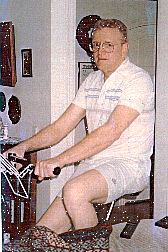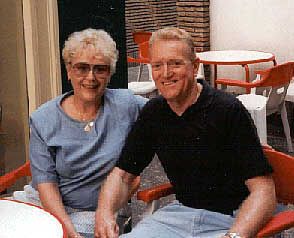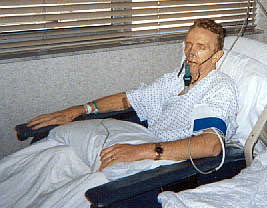Haunted By Deadly Dust
William "Bill" Burgess was born sixty-six years ago in Canton, Ohio. Canton is a steel town -- a town that captures the blue collar work ethic, as well as the blue collar aches, pains and worse. Bill learned at an early age that the human body was breakable; his father worked at Republic Steel Mill. He had seen the grizzled, drooping faces of men who had nearly been broken in half from a life in the fiery furnaces. Bill knew that to break the chain of misfortune he would have to take special care of his body.
As a teenager, Bill immersed himself in sports and learning. He realized that a solid body and a sound mind were the best investments he could make in his future. He was a standout basketball player and track sprinter. He set several school records, including a phenomenal forty-seven (47) second quarter mile. Even by today's standards, a 47 second 440 yard dash will win most college meets. Bill clocked 47 in 1948, as a senior in high school! In 1948, he was considered a top contender for the United States Olympic team. But bad luck struck. Just before the Olympic Trials, Bill was beset with pneumonia and had to scratch from the competition.
Naturally, Bill was distressed. Who wouldn't be? He had one of the fastest times in the Nation and he dreamed about representing his country in the Olympics -- just four years after the United States sacrificed so much to turn back the tides of fascism and Nazism in Europe and the Orient. But Bill learned a valuable lesson: despite the best care, the body will occasionally break down, so you better build up the brain if you want to amount to anything in this world.
Bill wanted to serve his country after graduating from high school. However, he was diagnosed with an eye malady and was classified "4F". That didn't deter him. Bill simply memorized the eye chart and, several attempts later, finally passed. He joined the United States Air Force. Bill served four years and upon his honorable discharge returned to Canton. For the next two years he worked in the Republic Steel Mill alongside his father. Bill soon became disenchanted with the daily grind, smoke, dust and despair. Bill knew his body was strong, but he wanted to improve his mind. When the mill went on strike in late 1958, Bill broke the chains and busted out. It was time to leave Canton for greener, loftier -- cleaner -- pastures.
Bill rejoined the Air Force where he remained for the next twenty years. He was stationed at military bases all over the world, including Maryland, Virginia, Spain, Germany, Bermuda and New Zealand. He participated in two tours of Vietnam. Bill saw the world in all of its glory, as well as its hideousness. He loved learning, and wanted to share his knowledge and inspire others.
Bill retired from the Air Force a Master Sergeant. In 1978, Bill earned a degree in elementary education while attending school during the day and working as a library aide during the night. Soon after, he earned a Masters Degree in Social Science Education. For the next fourteen years, Bill taught elementary and middle school in Florida. Bill's students loved him. At the end of the school year he would receive several 'thank you' letters from the children. All of them carried the same theme:
"Mr. B, you were a great teacher. I'll miss you." Jim
"I'll always remember those math pages. I hope I see you in middle school next year. You're a great teacher." Kathryn
Bill's students loved this kind and robust man. He didn't fit the stereotype of a bookish librarian. He continued to work out religiously and his chest grew to herculean proportions. Bill was particularly proud of the following letter from the parents of one of his students:
"My son has attended the school for over four years. School was always a "drag" to him. His grades were high, but he was bored. This year his attitude changed. Mr. Burgess has made him excited about school. He continually talks about new projects, books he reads, his homework, and everything else in his school day. His comments are almost always positive, and full of enthusiasm. We as parents are very fortunate to have Mr. Burgess on staff and my son is very fortunate to have him as a teacher." Matthew B.
In 1992, Mr. Burgess and his wife moved to Spain where he taught at the U.S. Naval Base in Rota, Spain. He was also an active member of the local Catholic parish, serving as an Extraordinary Minister of the Eucharist and Lector. Chaplain Donald E. Buchanan recalled: "Mr. Burgess was possibly the most popular teacher in the Department of Defense dependents grade school - popular with students and parents alike. He is definitely a "winner"."

When Mr. Burgess returned from Spain in 1997, he resumed teaching in the Central Florida School district. In the fall of 1998, Bill began to feel unusually run down and tired. Since his discharge from the Air Force, Bill had continued his exercise regime. No matter where he was in the world, he would find a bike to ride, a trail to run or a gym with weights to hoist. A dedicated weight lifter, Bill knew something was wrong when his bench press began to suffer. At sixty-six (66) years old, six foot one, two hundred and ten pounds, Mr. Burgess could still push two-hundred and twenty (220) pounds of free weight off his chest. He had transformed his garage into a gym, complete with Olympic free weights, barbells and several stationary bicycles. "I could never go to a health club or a spa -- those places are too foo-foo for me," Mr. Burgess chuckled. Mr. Burgess was, as they say, rock-solid.
In November of 1998, Mr. Burgess began to suffer symptoms that he thought were related to pneumonia. He went to his doctor who concurred. He was treated with antibiotics and advised to scale down his exercise program (this is like telling a preacher to stay away from Church!). The symptoms became worse. A chest film revealed a right pleural effusion. A thoracentesis was performed on November 20, removing 1.3 liters of fluid. The cytology was negative. Three (3) days later, a second thoracentesis removed 500 cc's of fluid. This time the cytology returned suspicious cells.
Mr. Burgess was then referred to a thoracic surgeon at the Orlando Regional Medical Center for a tissue biopsy which was performed on April 1, 1999. The pathology revealed a tumor called epithelial mesothelioma. Bill's surgeon had completed his residency training under Dr. Harvey Pass of the Karmanos Cancer Center in Detroit, Michigan and he referred the Burgess' to his mentor, Dr. Pass.
Dr. Pass reviewed Mr. Burgess' medical records and considered him an excellent candidate for an extra-pleural pneumonectomy (EPP) with adjuvant therapy. On May 4, 1999, Dr. Pass performed the EPP, which involved the removal of the lung, repair of the pericardium and diaphragm, and radical lymph node dissection. Upon entering Mr. Burgess' chest cavity, Dr. Pass discovered a large amount of disease in the 'gutter' on the lateral side that was stuck to the diaphragm. Postoperatively, Mr. Burgess had another 'visit' of pneumonia while being transferred from the intensive care unit to the hospital floor. He was treated aggressively with antibiotics. Mr. Burgess was released from the hospital ten (10) days later.

Mr. Burgess returned to Florida and underwent six (6) series of chemotherapy treatments. Dr. Pass actively coordinated the treatments from Detroit. The treatments included Cisplatin and Gemcytabine. Since the beginning of the year, Mr. Burgess had lost nearly forty (40) pounds. His last treatment was in August and he quickly returned to the garage to resume his rigorous weight training.
Mr. Burgess is the type of person who sets goals and has the discipline to reach them. His goal was to regain his pre-surgery strength, despite the fact that he was minus one lung. Ignoring the pain and the post-EPP physiological deficits, Mr. Burgess' bench press strength slowly returned. After several weeks of effort, he was able to reach his first milestone: 200 pounds on the bench (a few years ago he used to "warm up" with 200 pounds). His motivation rocketed upward.
But just before Thanksgiving, Bill began gagging and was unable to eat. He was also experiencing severe abdominal pain.He could no longer eat much but paradoxically his stomach began to swell grossly. On Sunday, November 21, he was admitted to the Winter Park Memorial Hospital. Doctors performed a paracentesis which resulted in the drainage of 2 ½ liters of fluid. The fluid was mostly negative with a few unusual cells. On Wednesday, November 24, another 30 ml was drained to make him more comfortable for the upcoming Thanksgiving holiday, which he spent at home with his loving family.
On November 29, Bill was re-admitted to the hospital after experiencing another build-up of abdominal fluid and swelling in his right arm. A port was inserted into his upper left chest bone. On December 2, he had his first chemotherapy treatment, which included Carboplatin and Gemcytabine. On December 5, Bill began suffering chills. His doctors discovered pneumonia in his left lung and several blood clots. The entire left side of his body was grotesquely swollen - arm, hand, leg, and foot. The doctors did not schedule another treatment until the pneumonia was resolved.

Mr. Burgess anticipated being discharged over the upcoming weekend, but the pneumonia that he had learned to live with was now exacerbating his tumor-weakened decline. His condition worsened and on Sunday, December 5 he was moved into the Intensive Care Unit, where he received two units of blood. The doctors were reluctant to say that Mr. Burgess had peritoneal mesothelioma (tumor spread to the abdominal linings), but Dr. Pass believed this was likely the culprit.
The next week, Bill showed signs of improvement. He began to eat solid foods. On December 11, he was moved out of ICU. But, as quickly as the optimism arrived, it was taken away. His condition began to worsen late in the week. On December 18, he was moved to the hospice unit at the hospital. On December 21, he was moved to hospice at home. On December 23, 1999, Bill Burgess died. He left behind many memories instilled in the minds of children through out the school district. According to his wife, Marylou: "He really loved learning. What he gave to these children was the love of learning. He just encouraged everybody all the time. He was a very excellent example of a good human being." His daugher Marylee simply stated, "Dad had many layers to him, but I think deep down inside, he was basically a card-playing, popcorn and barbecue eating, country music loving, American man."
Master Sergeant William F. Burgess had succeeded in escaping the dust and despair of Republic Steel. Unfortunately, he carried the dust with him, in his lungs, and the asbestos dust proved his undoing. Bill's family, friends, and all the students who today carry in their hearts and minds the will to pursue excellence, mourn the loss of this exceptional human being.
A EULOGY to William F. Burgess, from his son, Bill Burgess, December 27, 1999
(... I know that by today's standards 66 is a young age to be told you have a terminal illness. Remember his life was a good life full of learning, teaching, travel, fantastic experiences and the adorning love of his children, grandchildren, friends, students, and wife. Yes there was sacrifice and difficult times, but on the whole by anyone's standards it was a wonderful life...)
A TRIBUTE to William F. Burgess, from his son, Phil Burgess, December, 1999
(...The makers of these Asbestos products will pay, and they will know my Father like we knew him. They will know that he served two terms in Viet Nam, raised four children, 11 grandchildren, paid his own way through college while raising a family and working as a librarian...)
*** POSTED JANUARY 20, 2000 ***


